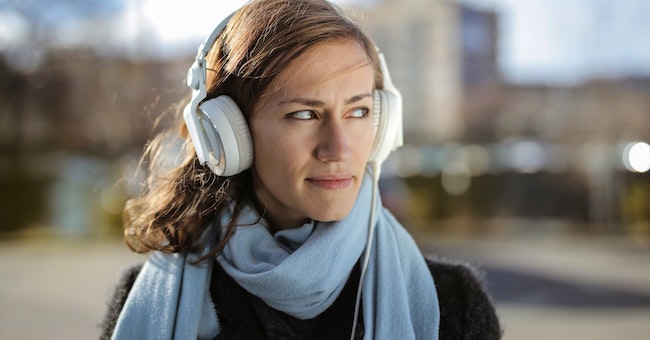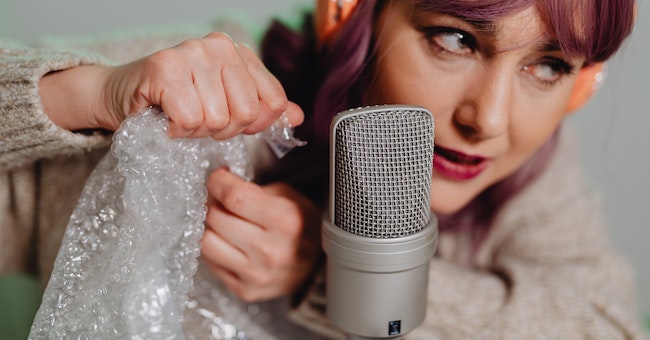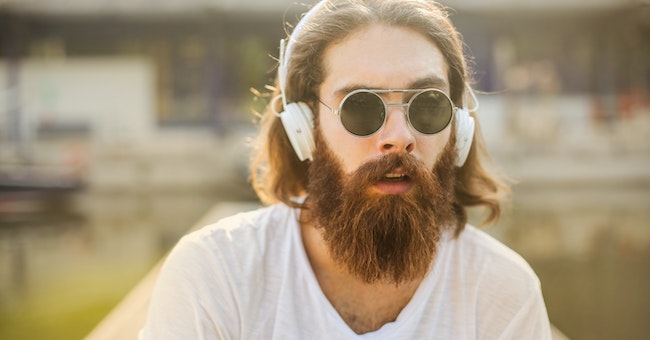Can Wearing Headphones Cause Hair Loss And Dandruff?
First, no research suggests that over-ear headphones cause hair loss for both genders. In reality, it’s highly unlikely that headphones cause hair loss.
Wearing headphones will not cause direct hair loss or dandruff. Dandruff and hair loss tend to result from a range of causes, including health issues, genetic hair loss, scalp issues, hormonal changes or stress, and certain medical ailments. Without any other cause, headphones do not necessarily have a direct connection to these problems.
But if they are used for a prolonged time without proper hygiene, it can result in the buildup of sweat, dirt, and oil over the hair, creating dandruff and irritation to the scalp. In these instances, it is crucial to maintain a healthy scalp by regularly washing and drying your scalp and hair and cleaning the headphones.
It is also recommended to stop wearing headphones for long periods so that the scalp can breathe and reduce the risk of irritation. While headphones aren’t directly responsible for hair loss or dandruff, a lack of proper hygiene when using them could lead to scalp issues.
Does My Hair Grow Back After I Quit Wearing Headphones?
It is important to remember that hair loss and growth are intricate processes influenced by many elements. Although removing headphones by itself may not result in hair growth, it can help improve the scalp’s health, which could aid in hair growth. Here are some important points to take into consideration:
- Eliminating Potential Causes: Various causes, including genetics, hormone fluctuations, nutritional deficiencies, and scalp problems, could cause hair loss. If you believe that wearing headphones contributes to losing your hair, it is crucial to determine and treat the root cause. Talk to a medical professional or dermatologist to discover the root cause of hair loss, and then consider the best treatments.
- Promotion of Scalp Health: In the long run, wearing headphones could result in the buildup of sweat, oils, or dirt that accumulates on scalps, possibly creating scalp irritation and the development of dandruff.
If you stop the long-term use of headphones and ensure regular scalp hygiene, like regular washing with a gentle shampoo, you can provide a more healthy environment that promotes hair growth. Keeping your scalp free of excessive buildup will help to avoid conditions that can slow hair growth. - Enhancing Blood Circulation: Healthy blood circulation is vital to supply oxygen and nutrients to hair follicles and promote healthy hair growth. Tight or tight headphones worn for prolonged periods may limit the hair’s blood circulation. Reducing the amount and length of headset usage will allow greater blood flow to the scalp. This could improve hair growth.
- Affirming a Balanced, Healthy Lifestyle: The growth of hair is influenced by lifestyle and overall health aspects. Ensure you have a healthy diet of minerals, vitamins, and proteins. These nutrients are essential for the growth of healthy hair. In addition, reducing stress levels and engaging in regular exercise will positively affect the health of your hair. Remember that hair growth will be gradual, and it could take some time to see noticeable changes.
- To Seek Professional Advice: Suppose you’re worried about the loss of hair. In that case, you should consult with a medical professional or dermatologist who can assess your situation, perform the necessary tests, and offer individualized recommendations or treatment for hair loss. They will help you identify root causes and suggest suitable measures to meet your requirements.
While removing headphones by itself may not result in hair growth, it could contribute to the scalp’s health, encouraging hair growth. Addressing the potential causes, maintaining a healthy scalp, promoting blood circulation, maintaining a healthy lifestyle, and seeking professional help are important in encouraging hair health and growth.
How Can You Remove the Hair From Your Headset?
If you’re suffering from “headset hair,” which is the term used to describe the flattened or indented hair that is left behind after wearing headphones, here are a few ways to eliminate it:
- Adjusting the Headphone Placement: The proper positioning of your headphones can aid in reducing the tension and friction they cause your hair. It is recommended to put the earcups or headband of your headphones a bit higher or lower than your head instead of directly on top of the hair’s crown. This helps distribute the stress more evenly and reduces the risk of flattened or indented hair.
- Using a Barrier to Protect Yourself: To keep your hair safe against direct exposure to headphones, put a soft, thin cloth or a dry, breathable bandage between the hairband and headset. This can reduce friction and lessen the damage to the hairstyle.
- Picking Headphones With Hair-Friendly Features: You should consider using headphones with designs that are less prone to causing flattening of the hair. Choose models with larger or more flexible headbands and earcups that change or adapt to your face. These features aid in spreading pressure more evenly and reduce the effect on the hairstyle you’re wearing.
- After Using, Refresh Your Hair: After you have removed the headphone, you can use various techniques to refresh your hairstyle. Apply gentle pressure to your scalp using your fingers to improve blood flow and increase volume. You can use an oversized comb or brush with soft bristles to lightly smooth and shape your hair. Also, applying a volumizing or texturizing spray to the root can add lift and improve the appearance of hairstyles.
- Thinking About Alternative Options For Listening: If you are prone to experiencing hair in your headsets and it’s a problem for you, then you might be interested in exploring choices for listening, like wireless earbuds or in-ear headphones. They can reduce the tension and friction that can be felt on your hair, which reduces the likelihood of hairstyle damage.
Be aware that certain styles are less prone to flattening, like braids, updos, or hairstyles full of volume. Experimenting with various hairstyles and locating ones that fit your headphones may aid in reducing the effects of flattening.
Preventing and eliminating hair on your headset requires using preventive measures, changing the position of your headphones by using protective barriers, choosing hair-friendly headphones, rehydrating your hair after each use, and evaluating alternatives to listening. These tips reduce the effect that wearing headphones has on your style.
Why Does My Head Scratch While Wearing Headphones?
Itching on your scalp while wearing headphones could be due to various possibilities. There are several possible reasons and explanations for why your head might itch while wearing headphones:
- Heat Buildup and Sweating: In the long run, wearing headphones may cause sweating to increase and a buildup of heat around the hair. Combining sweet heat and friction can result in itching. It can also result in an environment that is moist and favorable to the development of fungi or bacteria, which can cause scalp itching and irritation.
- Allergy Reactions: Certain individuals might be allergic to components used inside the headphone, like the padding made of foam or the metals that make up the frame. The allergic reaction can cause irritability, inflammation, and itching.
- Pressure or Tightness: If the headphones are positioned too tight or put significant stress on your scalp, this could result in itching and discomfort. The continuous pressure applied to the skin could irritate and alter the balance of the scalp.
- Poor Hygiene: Poor hygiene practices, for example, infrequent washing of the headphones or not cleaning the scalp after wearing headphones, may result in the buildup of sweat, dirt, oil, and dead skin cells. This buildup could irritate the scalp and cause itching. It can also cause conditions such as dandruff.
- Skin Conditions: People with pre-existing scalp issues, such as psoriasis, seborrheic dermatitis, or eczema, could be more susceptible to itching while wearing headphones. The combination of heat, pressure, and friction can worsen underlying conditions and cause more itching and discomfort.
- Psychological Aspects: Sometimes, itching sensations could be due to psychological issues such as anxiety, stress, or a pre-conditioned response. These causes can increase sensitivity and scalp itchiness even without a direct physical reason.
It is important to remember that every person’s experience and the causes of scalp itchiness while wearing headphones can differ from person to person. If you’re experiencing frequent or intense itching, you should talk to a doctor or dermatologist for an in-depth evaluation and the appropriate treatment. They will be able to identify the root of the issue and provide advice on managing and relieving itching efficiently.
Do You Think It is Harmful to Wear Headphones for a Long Time?
The habit of wearing headphones regularly can have positive and negative consequences. Here are some things to think about when assessing the possible negative effects of regularly wearing headphones:
- Hearing Damage: One of the main issues that arises from the regular use of headphones is the chance of hearing loss. Music or audio with high volume for prolonged periods could damage the delicate structures inside the ear, leading to hearing loss or even tinnitus (ringing in the ear). It is essential to follow safe listening habits like maintaining the volume at a reasonable level and making sure you take frequent breaks to give your ears a break.
- Otis and Ear Discomfort: Using headphones for long periods can create ear pain, especially when the headphones aren’t well-fitted or exert pressure on the ear. This can cause discomfort in the ear, soreness, and even an infection of the ear. It’s essential to choose headsets that feel comfy and well-fitted and clean them frequently to minimize the chance of fungal or bacterial growth.
- Social Isolation: In the event of frequent use, headphones can cause social isolation as they create barriers between yourself and your friends. It can hinder communication between people and social interactions. It’s crucial to strike an equilibrium and be aware of how headphones can impact your social interactions and overall wellbeing.
- Influence on Awareness of Situations: Headphones can hinder your capacity to remain conscious of your surroundings, especially when used when vigilance is essential, like when traveling on roads or participating in outdoor pursuits. A lack of awareness of your surroundings could result in dangerous situations or accidents. Using headphones responsibly and putting safety first by staying alert to your surroundings is essential.
- Problems With Hair and Skin: Prolonged use of headphones could result in skin-related issues, especially if the headphones aren’t cleaned or sweat, oil, or dirt get onto the surface of your skin. This can lead to acne breakouts, irritations to the scalp, or Maintaining good hygiene, washing the headphones frequently, and taking breaks while wearing them can reduce these problems.
- Psychological Effects: A few people can become dependent on headphones to escape or as a way to cope, which could cause withdrawal or dependence symptoms when they are not in use. Maintaining an appropriate equilibrium between wearing headphones for enjoyment or productivity and participating in other activities that help promote wellbeing is essential.
While wearing headphones regularly can be problematic, knowing about these problems and taking the appropriate steps will help reduce the risk. It is essential to maintain safe sound habits, pick comfortable headphones, practice high hygiene levels, focus on social interactions, and remain conscious of your surroundings. If you do this, you can enjoy the benefits of headphones while minimizing the negative effects on your overall health and way of life.
Can Wearing Headphones Cause Permanent Hair Loss?
The fact is that wearing headphones will not directly cause permanent hair loss. Many aspects, like hormonal changes, genetics, health issues, nutritional deficiencies, and certain medications, often cause hair loss. Here are some crucial factors to take into consideration concerning the effect that headphones have on the loss of hair:
- Incomplete Direct Causation: The mere fact that you wear headphones does not directly contribute to losing hair for life. Headphones cannot result in permanent hair loss because hair loss is a complex process that is influenced by both internal and external factors.
- Indirect Causes: While headphones can’t directly result in permanent hair loss, certain practices associated with using headphones may indirectly contribute to hair loss problems. For instance, using headphones for long periods without regular hygiene routines could irritate the scalp, accumulate sweat and oil, or cause the appearance of dandruff-related conditions.
These problems can affect the general condition of the scalp and hair. However, they’re not the primary reason behind permanent hair loss. - Individual Susceptibility: People’s hair and scalp features differ in various ways, and certain people could be more susceptible to certain hair-related issues than others. Factors like genetics, conditions on the scalp, and the hair’s general health can affect how the hair reacts to headphones. While headphones can do more harm than good for existing problems, they do not cause permanent hair loss.
- Hygiene and Balance in Use: To reduce the negative effects of headphones on your hair’s health, it is crucial to practice proper hygiene. This includes cleaning the headphones regularly, ensuring hair hygiene by washing your scalp and hair regularly, and avoiding long periods of wearing headphones without breaks.
A well-balanced approach to using headphones and prioritizing hair and scalp health can reduce the risk of negative effects. - Causes That Underlie Them: If you’re experiencing ongoing hair loss or have concerns regarding your hair, it’s crucial to talk with a medical professional or dermatologist. They will assess your situation, determine the root causes of hair loss, and recommend the appropriate treatment or treatments. Hair loss is a challenging problem, and understanding the root of the issue is essential to finding solutions that work.
Wearing headphones doesn’t directly cause permanent hair loss. However, poor hygiene practices related to using headphones could result in scalp problems and hair issues. It is essential to maintain excellent hygiene. Seek expert advice if you are experiencing hair loss concerns and deal with any other underlying issues that could be causing hair loss.
Are Wireless Headphones Safe for the Scalp and Hair?
In terms of your hair or scalp security, wireless headphones could offer some advantages over wired headphones. Here are some things to take into consideration regarding the potential advantages of wireless headphones:
- Reduction in Friction and Pressure: Wireless headphones are usually lightweight and have a more flexible design when compared to wired headphones. This may help decrease the volume of friction and pressure put on the scalp and hair. When there is less friction and pressure, you are less at risk of breaking your hair, injury to your hair’s shaft, or a rash on your scalp.
- Elimination of Wire-Related Problems: Wireless headphones come with cables that can become tangled or caught within your hair, leading to hair pulling and breaking. Wireless headphones avoid this issue completely, providing more comfortable listening without the risk of wires destroying hair or creating discomfort.
- Freedom of Movement: Wireless headphones allow you to move freely around the room without being tied to a device via cables. This can prevent accidental pulling or yanking of the headphones’ cord, reducing the chance of hair becoming stuck and causing discomfort or injury.
- Lower Risk of Acquiring Headphone-Related Infections: Certain headphones with wires could necessitate frequent sharing of them or sharing between individuals, which could increase the chance of spreading fungi, bacteria, or other bacterial strains found on the headphones’ surfaces. Wireless headphones, intended only for personal use, can eliminate this risk and lower the chance of infections that can impact the health of the scalp and hair.
- Hygiene and Hygiene: Wireless headphones are easier to clean and maintain as compared with wired ones. Since there are no cables to be concerned about, you can concentrate on cleaning your headphones’ surfaces and earcups more efficiently, reducing the buildup of sweat, dirt, and oil, which can cause hair issues or scalp irritation.
While wireless headphones have many advantages, it’s important to remember that good hygiene and responsible use are still vital to keeping your health in check. Head and hair. Regularly cleaning your headphones, maintaining a healthy scalp, and taking breaks during prolonged headphones use are essential practices regardless of whether you’re using wireless or wired headphones.
Wireless headphones may provide benefits for protecting your scalp and hair by decreasing friction, pressure, and the possibility of damage to your hair. They also help eliminate issues with wires, allow for freedom of movement, and make it simpler to maintain a healthy lifestyle.
But, no matter what kind of headphones you choose to use, keeping a clean and healthy lifestyle and being aware of your use are essential to ensuring the wellbeing of your hair and scalp.
How Often Should I Clean My Headphones to Maintain Scalp Hygiene?
Cleaning and maintaining the headphones’ cleanliness are crucial for your scalp’s health. Here are some tips for thinking about how often you need to clean your headphones:
- Regularly Scheduled Routine Cleaning: It is generally advised to clean your headphones frequently, especially if you use them often. Implementing a routine for cleaning will prevent the accumulation of sweat, dirt, oil, and other bacteria on headphones’ surfaces. Cleaning frequency may differ based on individual use patterns and environmental conditions.
- Consider Usage Intensity: If you wear your headphones for prolonged durations or participate in activities that cause you to sweat more, like exercise or outdoor activities, you might have to wash your headphones more often. Using headphones for long periods can cause the accumulation of sweat to the extent that it can encourage the growth of fungal or bacterial organisms and may affect scalp health.
- Evaluate External Factors: Things like dusty and humid environments and exposure to dust could influence the speed at which your headphones build up dirt. If you reside in a humid, dusty place or often wear your headphones in these situations, you might have to wash them often to ensure optimal hygiene.
- Personal Hygiene Practices: Your personal hygiene routine and the state of your scalp may affect how often you wash your headphones. Suppose you suffer from oily scalp or dandruff scalp problems. In that case, cleaning your headphones more often will assist in stopping the transmission of cellulite or potentially irritating substances back onto your hair.
- Manufacturer’s Guidelines: It’s essential to refer to the user’s guide or manual given by the manufacturer of the headphones you have purchased. They could provide specific directions regarding how to maintain and clean your headphones, along with the suggested frequency for cleaning and techniques. Follow the recommendations of the manufacturer to aid in cleaning your headphones efficiently without causing damage.
The frequency of cleaning your headphones for hygiene reasons is contingent on your habits of use, environmental factors, personal hygiene routines, and the manufacturer’s guidelines. It’s recommended to set up a regular cleaning routine and then adjust the frequency according to your specific requirements.
Maintaining your headphones in good condition will reduce the chance of irritation to your scalp, dandruff, and other scalp issues caused by unclean headphones.
FAQ’s
Q: Can wearing headphones cause hair loss?
A: No, wearing headphones alone does not directly cause hair loss. Hair loss is primarily influenced by factors such as genetics, hormonal changes, medical conditions, or certain medications. Wearing headphones may lead to hair breakage if they are too tight or cause friction, but it is not a common cause of hair loss.
Q: Can wearing headphones contribute to dandruff?
A: Wearing headphones can potentially contribute to dandruff if they create a warm and moist environment around the scalp, promoting the growth of yeast-like fungi that are associated with dandruff. However, this is more likely to occur if the scalp is already prone to dandruff or if headphones are not kept clean.
Q: How can I prevent hair breakage when wearing headphones?
A: To prevent hair breakage while wearing headphones, choose headphones that fit comfortably without excessive pressure. Opt for headphones with cushioned ear cups and adjustable headbands. It’s also helpful to give your hair regular breaks from headphones and vary their placement to avoid constant pressure on the same area.
Q: What can I do to minimize the risk of dandruff from wearing headphones?
A: To minimize the risk of dandruff, keep your headphones clean by regularly wiping them with disinfectant wipes. Additionally, maintain good scalp hygiene by washing your hair regularly, using a gentle shampoo, and ensuring your scalp is thoroughly dried after washing to prevent excess moisture buildup.
Can wearing headphones lead to scalp irritation or itchiness?
A: Wearing headphones for extended periods, especially if they are not clean, can potentially lead to scalp irritation or itchiness. It is important to keep your headphones clean and practice good hygiene by regularly washing your hair and keeping your scalp moisturized.
Are there any precautions I should take when wearing headphones?
A: When wearing headphones, take breaks periodically to allow your scalp to breathe and reduce the risk of moisture buildup. Clean your headphones regularly and avoid sharing them with others to minimize the potential spread of germs. If you notice any signs of scalp irritation or discomfort, consider using a different type of headphones or consulting a dermatologist.













